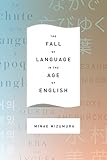The fall of language in the age of English / Minae Mizumura ; Translated by Mari Yoshihara and Juliet Winters Carpenter.
Material type: TextLanguage: English Original language: Japanese Publication details: New York : Columbia University Press, c2015.Description: xi, 221 p. ; 24 cmISBN:
TextLanguage: English Original language: Japanese Publication details: New York : Columbia University Press, c2015.Description: xi, 221 p. ; 24 cmISBN: - 9780231163026 (cloth : alk. paper)
- Nihongo ga horobiru toki. English
- 495.609/051
- PL 523.5 M685f 2015
| Item type | Current library | Home library | Collection | Shelving location | Call number | Vol info | Copy number | Status | Date due | Barcode |
|---|---|---|---|---|---|---|---|---|---|---|
 Libro
Libro
|
Biblioteca Juan Bosch | Biblioteca Juan Bosch | Humanidades | Humanidades (4to. Piso) | PL 523.5 M685f 2015 (Browse shelf(Opens below)) | 1 | 1 | Available | 00000117013 |
First published in Japan in 2008 by Chikumashobo Ltd., Tokyo. entitled "Nihongo ga horobiru toki: Eigo no seiki no naka de."
Includes bibliographical references (p. 209-210) and index.
Under the blue sky of Iowa : those who write in their own language -- From par avion to via air mail : the fall of french -- People around the world writing in external languages -- The birth of Japanese as a national language -- The miracle of modern Japanese literature -- English and national languages in the internet age -- The future of national languages.
Winner of the Kobayashi Hideo Award, The Fall of Language in the Age of English lays bare the struggle to retain the brilliance of one's own language in this period of English-language dominance. Born in Tokyo but raised and educated in the United States, Minae Mizumura acknowledges the value of a universal language in the pursuit of knowledge yet also embraces the different ways of understanding offered by multiple tongues. She warns against losing this precious diversity. Universal languages have always played a pivotal role in advancing human societies, Mizumura shows, but in the globalized world of the Internet, English is fast becoming the sole common language of humanity. The process is unstoppable, and striving for total language equality is delusional―and yet, particular kinds of knowledge can be gained only through writings in specific languages. Mizumura calls these writings "texts" and their ultimate form "literature." Only through literature and, more fundamentally, through the diverse languages that give birth to a variety of literatures, can we nurture and enrich humanity. Incorporating her own experiences as a writer and a lover of language and embedding a parallel history of Japanese, Mizumura offers an intimate look at the phenomena of individual and national expression.


There are no comments on this title.